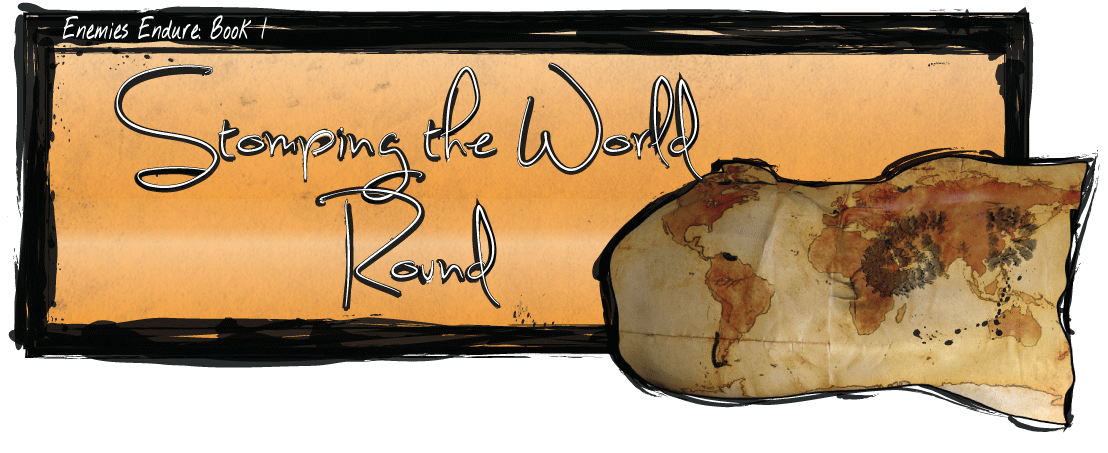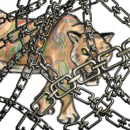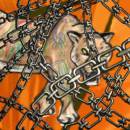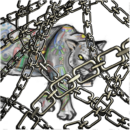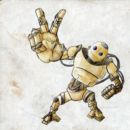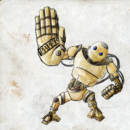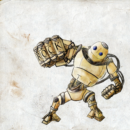. . .
Bahlum tears free
— and he fails. He is slapped down.
He is only a solitary magical jaguar, after all. He is small before the writhing wicked substrate-slipping spirit-sapping scissors-will of the wicked god of space.
. . .
Bahlum’s fate startles the other jaguars from their stupor.
They break free from the frigid force of Thon-Gul’s magic. They turn on him, and on his swarm.
They gather up their jaguar power —
. . .
But the magical jaguars are weakened and they are sick. They are moving slowly. Their power is frail. People keep mocking them on television about their missing apocalypse, which is hardly fair, considering the fact that nobody consulted them on it, their ears provide terrible television reception, and they are suffocating over the course of endless centuries in a decaying orbit around the Earth.
Also they are bad at calendars.
Really bad.
They gather their power to fight the wicked god of space but it is frail. They are frail. They can barely protect a narrow band of Mesoamerica, and they themselves.
– 7 –
Emily goes outside to play.
She has burned out even Navvy Jim’s endless patience with her variant symbols and her insistence on incorporating new elements into the game; he takes joy in her but she has made him dizzy; so she leaves him behind for this, and she goes out to hunt for fun and treasure in the grass.
She is alone, far from home, and helpless; and she will never remember how she found the strength in her to call to him, or how it was he came.
She is just standing there, in her perfectly safe little town on her perfectly safe little planet that nothing bad could ever happen to.
Then scissors fall.
The first pair lands not far from Emily. It buries itself three inches into the soil, humming, deadly, before going still and leaning softly against the grass.
Emily looks up.
She looks at the scissors, then up, then down again. They have safety plastic handles so that they do not cut anybody who is sneaking up behind them when they are flying along in space.
Another pair comes down.
She wobbles over to them. She squats down beside them. She pokes them with a chubby finger.
In falling to earth without burning up the scissors have exhausted their malevolence; the injury to the soil is all that this particular pair will do.
A few more scissors fall.
At this point in most of the world — most of the sunlit world, of course, the scissors falling only from a single side of the planet, a ten-hour band, really, with flurries at their edges, as seen from Earth — the malevolence of them isn’t obvious yet. Here and there they do damage. There are a few humans who get killed. There are cars whose alarms go off. If only humans had heeded their warnings! There is damage done to delicate sails, and wires that are cut, and animals that take hurt. A breaching whale gets scissors to the blowhole and — while not really injured injured — is never thereafter quite the same.
At this point you could think it’s a fluke. Then, as a few more fall, you would think, instead: phenomenon.
Not even the adults are scared by the scissor-fall. Not yet. Not even Eldri.
They’re not frogs, after all, those scissors. They’re not fish, they’re not jaguars, and they’re certainly not men. There’s certainly no way, not with scissors, that you could get a solid rain.
. . . except you do.
. . .
Eldri is squinting out his glass door at his patio. He’s thinking, hm.
Navvy Jim, drawn by an impulse that he can’t explain, is walking out into the yard.
Emily, she’s getting a little puzzled. She’s starting to feel concerned. This is something silly. This is something wrong. This can’t be happening. She knows.
Somebody is catapulting scissors in her direction. Somebody else ought be told.
Elsewhere in the world there are others noticing. There is baby Cheryl, who is Emily’s cousin, turning her face upwards towards the storm. The light of the scissors glints into her eyes. There is teenaged Jeremiah Sandiford, who is sick with fever and feels a sudden chill. There is the Scissors Study Institute attached to CERN: they make projections; they pull long faces; they feel a fear. And Fenris lifts up its head and it sniffs the air and it howls.
It would have been too late already even if Emily had started running — even if she’d seen the first pair of scissors fall and run for home. There would have been no way that she could make it. Not even then. It was destiny, it was inexorable, it was necessity, that took Emily out there, that caught her standing in that storm.
She opens her mouth to say something. She doesn’t ever know what it would have been.
The sky opens.
The bright green fields around Bibury, where Eldri summered his god-daughter Emily, turned in an instant into no-man’s-land.
It is raining scissors.
There are no options. It is raining scissors, hard and sharp and cold. Emily is cut. She is cut a second time. She is bleeding from her leg, her face, her hand. She has no options. She is howling. She is terrified. This is not the way she wanted to die. This is not the way anybody but Nancy Paper, over in Betws-y-Coed, ever wanted to die; and Nancy Paper, more’s the pity, had died to the gall, instead, three years before.
. . .
The girl scrambles back against a utility pole. She huddles there. She looks around, but that doesn’t work out for her. She huddles her head in her hands and screams instead.
The wires are cut. They lash about her. They give the air to lightning.
Scissors slice her shoulder. A spark catches her pants on fire. She is going to die.
In the sky above a hungry pair of scissors has sighted her. It snaps its jaws and it hungers to kill her. It comes screaming down to stab her, right through the skull, and cut her open; and here is the end of Emily: one. Two. Three.
. . .
Eldri is on his feet. He is staring out the door. He is thinking Emily! But he doesn’t know what to do.
He picks up the Game-winning robot. He holds it over his head. He tries to run out into the storm.
He loses the Game when he does this —
He finds himself thinking about the Game, which, by the rules of the Game, means that he loses and he is supposed to exclaim that he has lost it —
But he doesn’t, possibly because his god-daughter is stranded in a killing storm.
The scissors rattle off of his Game-winning robot. He makes it ten feet out his door. He makes it out twenty. Then the scissors sight him. Then they are veering in for him, they are tracking him, they are trying to anticipate his pattern.
He screams, hoarsely, calling out for Emily.
He runs.
The robot he has over his head is not a tactical evasion robot. That would compromise its ability to never think about the Game. That had seemed important back when he’d created it. That had seemed like a key quality, that singlemindedness, that . . . empty-tuple-mindedness . . . rather than a critical weakness in the design.
He is beaten. They are beaten.
He is forced to scramble back behind the eaves of his house as the scissors veer and scissor in.
His roof rattles hideously. He hears and feels in the shuddering of his house the scissors cutting down along its gutters.
He puts down the Game-playing robot. He loses the Game. He looks for an umbrella. He flourishes it dramatically. He loses the Game. The umbrella will do no good
“Navvy Jim!” he says, suddenly.
He calls. He scrambles through his house. He searches. The robot isn’t anywhere. He huddles over in grief, fear, relief, a twisting stomach. he thinks: so he went for her already —
But the truth is, the robot might be made for fighting scissors, in a way, but not for fighting tens of millions of scissors, such as those that are falling over Bibury. He knows he has just lost his greatest work, and his god-daughter, and —
He tastes salt. He tastes salt
— his stoic pride, and damn it also he has lost the Game.
. . .
Eldri cannot help but laugh amidst his tears.
He knows it. He knows it is too late. He knows it is all pointless, all ruined, he would have been better off staying below and living out his life down among the svart-elves than ever coming up to the surface to live with humans and interact with humans and make wicked fetters for wicked wolves and make robots that play at games. His heart knows it. His mind knows it.
He knows it in his body and in his bones; but somehow he still cannot make himself believe that Emily is dead.
He stands there in the foyer through the day and into the early hours of the night. He wrings his hands. He sobs, brutal, racking, lung-clogging grief and —
Each time he does not go out into that awful rain —
And shame.
. . .
The hours pass and the rain fades to a trickle. The last few scissors are directionless, aimless, they are lit only by the candle-lights and flash-lights of the world below and these things are compromising their scissors-loyalties.
Eldri staggers out into the night.
This is grace. This is what grace is, what it means, at least to him:
Emily is alive.
. . .
She is crying. She is terrified. She cannot even see for the tears and snot of her, any more than he can once he’s found her, but she’s alive, there by the toppled, broken utility pole with Navvy Jim.
Eldri’s rock-paper-scissors-playing robot is battered and cut all along the gleaming metal of him, he is stumping, he has lost a leg, but he’s found her. He’s kept her safe.
He’s not a bodyguard robot.
This shouldn’t be happening. But it is happening anyway. He is standing there beside her. He’s kept her safe.
Maybe she threw rock, or scissors, or something, as the blades came down, and he had to be there. Maybe even tiger’s claw or whale. Maybe it wasn’t anything that she had done, just, you know, all him.
He is shaking his fist triumphantly in Eldri’s direction as Eldri staggers near.
His eyes are burning with triumph and with joy.
“Rock beats scissors,” says Eldri’s greatest robot, smugly, and Eldri takes his bloody, snotty, whimpering and clinging god-daughter and his battered robot, his beautiful god-daughter and his beautiful robot, his family and his heart and his dear dear loves, back home.
– 8 –
People are not beaten.
In the face of countless trillions of scissors falling on them from space, they retreat but they do not surrender. They hide in shelters and at night they creep out and they build metal domes. They make space lasers and other defenses. They learn to intercept the scissors’ communications among themselves and to send back signals that confuse them.
In the body of the great scissors-swarm, the Earth becomes a virus — a toxin — a cruel issuer of defeat.
. . .
The swarm is finite. It will be years before the first scissors that missed the Earth can turn about and head back — they are slung around the well of Earth’s gravity, pushed off by its sun, captives to their own momentum and to dread ballistics’ laws; it will not be until they reach Alpha Centauri (for some) and Wolf 359 (for others) that they will be able to turn themselves around for another strafe.
As for those that hit the Earth, they are denatured and defeated: on planet Earth, a pair of scissors can kill you once, when it falls from space, maybe twice, if somebody picks them up and runs with them, maybe even three times if they split a car’s tire and send it veering from the road — but ultimately, once they strike the ground, they cannot move.
So the world weathers the killing rain.
Time passes.
The scissors (and one screaming, burning jaguar) cease to fall.
